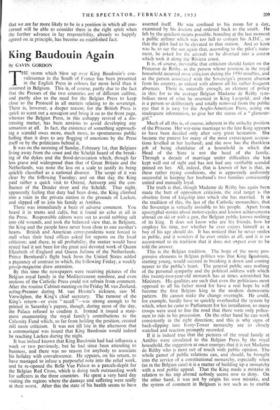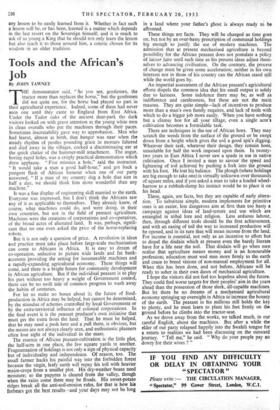King Baudouin Again
By GAVINGORDON ' It was on the morning of Sunday, February 1st, that Belgians living away from the coast and the Scheldt heard of the break- ing of the dykes and the flood-devastation which, though far less grave and widespread than that of Great Britain and the Netherlands, was none the less on a scale to justify its being quickly classified as a national disaster. The scope of it was clear by the following Tuesday; and on that day the King paid rather a quick visit to Ostend, Antwerp and the con- fluence of the Deader river and the Scheldt. That night, apparently feeling that duty had been done, the King climbed into a train in the private station in the grounds of Laeken, and slipped off to join his family at Antibes.
There was immediately a buzz of adverse comment. You heard it in trams and cafe's, but it found no echo at all in the Press. Responsible editors were out to avoid rubbing salt into old wounds, and took the balanced view that, in Belgium, the King and the people have never been close to one another's hearts. British and American correspondents were forced to stall when their head offices asked for reports on the local criticism; and there, in all probability, the matter would have rested had it not been for the great and devoted work of Queen Elizabeth of ...England and Queen Juliana of the Netherlands. Prince Bernhardt's flight back from the United States added a piquancy of contrast to which, the following Friday, a weekly gossip-magazine drew attention. By this time the newspapers were receiving pictures of the Belgian royal family in the Mediterranean sunshine, and even sections of the Catholic Press could not refrain from comment. After the routine Cabinet meeting on the Friday M. van Zeeland, acting-Premier during M. van Houtte's sickness, saw M. Verwilghen, the King's chief secretary. The rumour of the King's return or even "recall "—was strong enough to be printed in Saturday's papers, though, during most of the day, the Palace refused to confirm it. Instead it issued a state- ment enumerating the royal family's contributions to the Calamity Fund which, so far from holding the position, created still more criticism. It was not till late in the afternoon that a communiqué was issued that King Baudouin would indeed be reaching Laeken during the night. It Was indeed known that King Baudouin had had influenza a week or two previously, but he had since been attending to business, and there was no reason for anybody to associate his holiday with convalescence. He appears, on his return, to have managed to infuse a purposeful note into the relief work, and he re-opened the Belle Vue Palace as a parcels-depot for the Belgian Red Cross, which is doing such outstanding work for sufferers in the three countries. He spent a very- hard day visiting the regions where the damage and suffering were really at their worst. After this the state of his health seems to have asserted itself. He was confined to his room for a day, examined by his doctors and ordered back to the south. He left by the quickest means possible, boarding at the last moment a public airliner which was too full to contain his A.D.C., so that the pilot had to be elevated to that station. And so keen was he to see the sun again that, according to the pilot's state- ment, he asked for the aircraft to be diverted into a course which took it along the Riviera coast.
It is, of course, inevitable that criticism should fasten on the Pnncesse de Rethy, as the person whose position in the royal household incurred most criticism during the 1950 troubles, and as the person associated with the. Sovereign's present absence from his country, as indeed with almost all his rather frequent absences. There is, naturally enough, an element of policy in this; for to the average Belgian Madame de Rahy sym- bolises most of what he resented in King Leopold; and she is a person so deliberately and totally removed from the public eye that it is easy for the Anglo-American Press, acting on inadequate information, to give her the status of a "glamour- girl."
Much of all this is, of course, inherent in the unlucky position of the Princess. Her war-time marriage to the late King appears to have been decided only after very great hesitation. She became the pretext for many of the most extravagant accusa- tions levelled at her husband; and she now has the thankless job of being chatelaine of 'a household in which the Head of the State is not the head of the family. Through a decade of marriage under difficulties she has kept well out of sight and has not had any verifiable scandal pinned on her. All, indeed, that is known of her is that, in these rather trying conditions, she is apparently uniformly successful in keeping her husband's two families consistently united and mutually loyal.
The truth is that, though Madame de Rethy has again been made the butt of opposition criticism, the real target is the obsolete form of kingship into which she has married. It is the tradition of this, the last of the Catholic monarchies, that the Sovereign is virtually invisible to his people. Apart from apocryphal stories about motor-cycles and known achievements abroad on ski or with a gun, the Belgian public knows nothing of its king. It does not know who are his friends, how he employs his time, nor whether he ever enjoys himself as a boy of his age should do. It has noticed that he never smiles in. public, and it wonders if he ever smiles at all; and it is so accustomed to its tradition that it does not expect ever to be told the answer.
This is the Belgian tradition. The hope of the more pro- gressive elements in Belgian politics was that King EQudouin, starting young, would succeed in breaking it down and coming nearer to the public's heart. The general public sees nothing of the personal sympathy and the political address with which this twenty-two-year-old monarch has at times astonished his Ministers. His qualities are such that even the politicians most opposed to all his father stood for have a real hope he will become the first Belgian king in the modern democratic pattern. He cannot make the change overnight. He could, for example, hardly have so quickly overhauled the system by which, when he came to Parliament for his installation, so many troops were used to line the road that there were only police- men to ride in his procession. On the other hand he can work consistently in the right direction; and this is why signs of back-slipping into Ivory-Tower monarchy are so closely watched and reaction promptly recorded.
If it is indeed true that the pictures of the royal family at Antibes were circulated to the Belgian Press by the royal household, the suggestion at once emerges that it is not Madame de Rethy who is most out of touch with public opinion. The whole gamut of public relations can, and should, be brought into the service of a constitutional monarchy, especially when (as in the Belgian case) it is a matter of building up a monarchy with a real public appeal. That the King made a mistake in relation to his trip abroad nobody seems now to deny. On the other hand, it was not by origin his own mistake, and the system of comment in Belgium is not such as to enable any lesson to be easily, learned from it. Whether in fact such a lesson will be, or has been, learned is a matter which depends in the last resort on the Sovereign himself; and it is much to ask of so young a King that he should not only learn the lesson but also teach it to those around him, a coterie chosen for its wisdom in an older tradition.



































 Previous page
Previous page